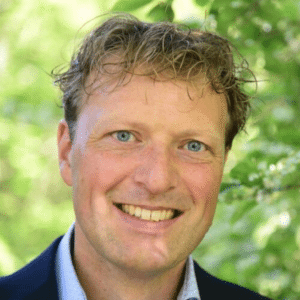
Bernhoven Hospital was on the frontlines as the first Dutch cases of COVID-19 surfaced in the southern province of Brabant. The hospital made positive headlines due to its warm relationships with staff and local residents. This is one of the main reasons the health care facility is not governed remotely, but partially financed by its own staff, ranging from medical specialists to cleaning personnel. From the moment the hospital chose this new management model in 2014, there has also been a shift towards becoming a ‘community hospital’ for the local community and its staff.
The first step towards employee participation at Bernhoven Hospital was taken by the medical specialists. They reinvested their compensation for being hired into their own hospital in 2016.
From 2018 onward, other staff members were allowed to participate also. Moreover, all employees receive a yearly participation dividend of 100 euros for the following five years, instead of additional salary. Meanwhile, a total sum of 20.5 million euros has been invested by staff and neighbours combined, for which an annual compensation of 4% will be paid. Bernhoven Hospital aims to offer its staff real shares in the organization in the near future.
MKB Netherlands, the Dutch SME association, pleaded for employees’ solidarity last week, and requested them to contribute to the recovery of companies in wake of the COVID-19 crisis.
The second government aid-package for companies expects employees to partially waive wages or agree to postpone holiday pay in order to lessen the financial burden on companies.
Labor unions were obviously reluctant, because employees would profit proportionally less from the strong growth of company profits. Participation schemes, in which employees share the risks now, but benefit from later positive return, could be a solution to this dilemma.

Loyalty
A recent poll by independent SME alternative finance thinktank ‘Stichting MKB Financiering’ and SME association ‘ONL’ showed that 22 percent of Dutch entrepreneurs are open to letting personnel participate, and benefit, from shared future profits. Among start-ups this trend of giving personnel the opportunity to partially share in profits through options, in exchange for a lower salary, has been going on for some time.
Employee participation could both stimulate, as well as reward, loyalty.
Internationally, several ideas on how to facilitate employee shareholdership have surfaced in recent years, among which the Employee Ownership Trust in Scotland, the so-called ‘Mitarbeiterbeteiligung’ in Germany, and the Employee Stock Option Plan (ESOP) in the United States.
There surely are practical concerns to employee participation, like the valuation of shares, workers leaving the organization, the concentration of risk, as well as the distribution and exchange of stocks at low costs. We shouldn’t be blind to these, but rather use the creativity of stakeholders to experiment, in order to stay afloat amidst this crisis by avoiding the accumulation of greater debts. Much work is being put into contractual innovations and solutions to make these things possible in the Netherlands, mainly by organizations like Eyevestor, The Share Council, and Firm24.
Bernhoven Hospital illustrates that there are possibilities for larger organizations to embrace these methods.
Another great, international example of a cooperative organization is the Spanish Mondragon with a yearly turnover of 12 billion euros and 80,000 employees. Yet, this model could fit many small and mid-sized enterprises as well, given that their transition would be actively incentivized.
Several players within the Dutch ecosystem could play a role here: the government could create fiscal incentives, while financers could cooperate by sharing their insights and services. Financial-technological suppliers could provide the infrastructure and pension funds could, in turn, supply investment.
Participation transforms employees into co-workers. In this way, we evolve from an economy consisting of employers and employees to value-creating communities.
 Ronald Kleverlaan is Chairman Stichting MKB Financiering & Director European Centre for Alternative Finance at Utrecht University. He is an international expert in the field of new forms of financing and advises the European Commission on a number of projects. He has been active in this sector as a researcher / advisor for over 10 years.
Ronald Kleverlaan is Chairman Stichting MKB Financiering & Director European Centre for Alternative Finance at Utrecht University. He is an international expert in the field of new forms of financing and advises the European Commission on a number of projects. He has been active in this sector as a researcher / advisor for over 10 years.

Prof. Dr. Erik Stam is Head of the Utrecht University School of Economics & Full Professor of Strategy, Organization and Entrepreneurship. Stam is serving Utrecht University, as Dean of the Utrecht School of Economics, Full Professor of Strategy, Organization & Entrepreneurship, Board Member of Strategic Research Theme Institutions for Open Societies, and Faculty Director of the Center for Entrepreneurship.

